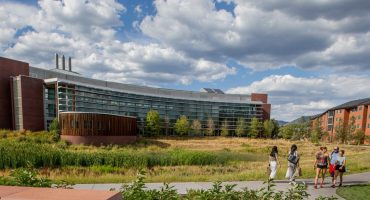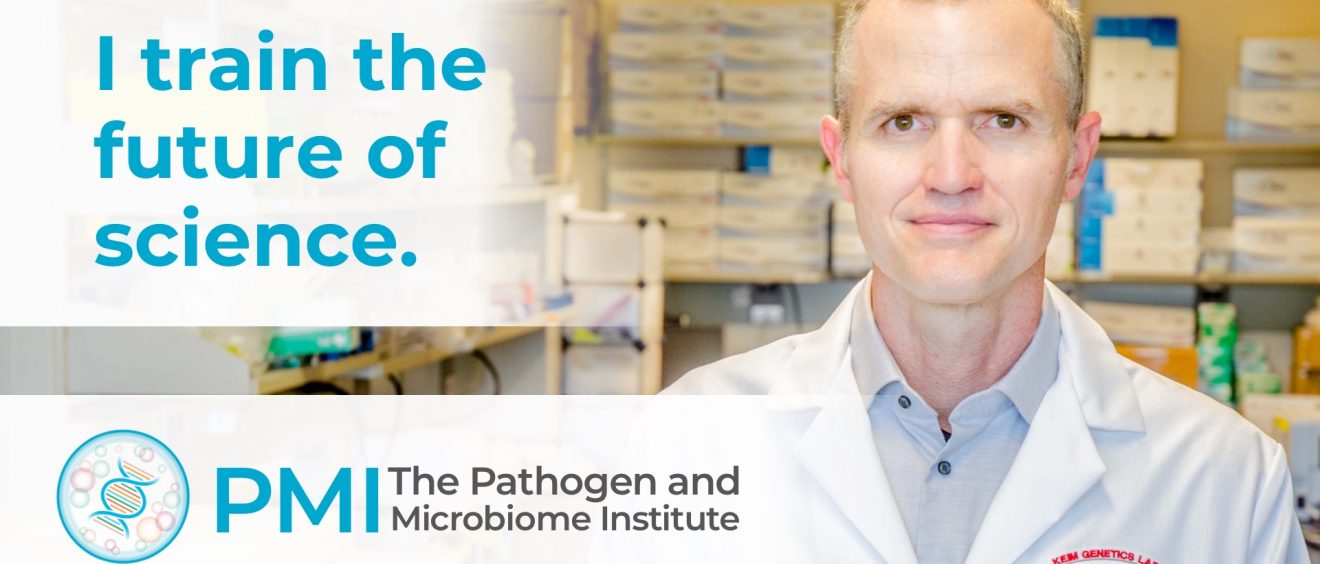
Dave Wagner | CDC Podcast
-
Research Professor
Faith Walker
Dr. Faith Walker delivered the keynote address for the 69th Annual Scientific Meeting of the Australian Mammal Society in Adelaide, South Australia. She spoke about her 30 years of studying the southern hairy-nosed wombat, her team’s work with environmental DNA to detect endangered species of bats, and their venture into airborne DNA to describe biodiversity. A live wombat was in attendance. She was joined at the conference and in the field by PMI alumnus Colin Sobek, who is a Ph. D. student at the University of Adelaide applying genomic tools to the critically endangered northern hairy-nosed wombat.
Walker Lab
-
Executive Director | PMI
Paul Keim
On October 6, 2023 we gathered at our annual All-Hands meeting to celebrate and recognize staff, faculty, students, and all current and recent projects we’ve accomplished here at PMI! Our annual meeting included a presentation on my recent sabbatical to Oxford, England and updates from the PMI leadership team on the endeavors of our labs. The students at PMI are the foundation that we build upon as PMI continues to conduct outstanding research, working to make an impact on the world. Enjoy our All Hands video as we share our projects with you.

-
Undergraduate Research Assistant
Kayla Ramirez
With my background of a supportive family, my fascination in all things biology has grown into the research career I have today. I am so grateful for the pathogen and infectious disease skillset that has been fostered in working with the Pearson Lab. Staphylococcus aureus is my research passion. I am tasked with determining the prevalence of staph to mitigate infections. Taking all of the experience I have gained at PMI, I am moving forward in my career by pursuing a medical degree and clinical research.
LinkedIn
-
Undergraduate Research Assistant
Reanna Bourgeois
Reanna Bourgeois, a Microbiology major at Northern Arizona University focuses her research on two tick-borne disease projects.
LinkedIn
Reanna’s research evaluates Rocky Mountain Spotted Fever in Rhipicephalus sanguineus ticks in southern Arizona. Secondly, she tracks the movement of cattle fever ticks (Rh. microplus and Rh. annulatus) in southern Texas while assessing their acaricide (insecticide) resistance.
Reanna is passionate about infectious disease research feeding into prevention and control as she aims to make meaningful contributions to public health. Her goal is to further advance her experience as a scientist through translational infectious disease research.
2023 Awards Host
Dawn Birdsell
Associate Director of Training and Education
Join our Team
With the focus on developing the next generation workforce, Dawn designs and organizes hands-on science training programs for PMI undergraduates. These programs foster foundational skills essential for career success.
Associate Director – Finance and Business Operations Core
Deborah Martin
Deborah “Debbie” Martin has many years of experience working at Northern Arizona University. She is an accomplished musician, playing the guitar, the violin, the organ, the piano, and voice. She holds a degree in music education; however, she enjoys serving at PMI as the associate director of the finance and business operations core. Her responsibilities in PMI entail everything other than science. Debbie is a two-time recipient of the NAU President’s Achievement Award. She came to PMI in 2010, after working in the Department of Geography, Planning and Recreation (GPR) for 16 years. Her strengths are personnel, human resources management, and finance. She prides herself in being a good steward of the funds entrusted to PMI and leads the admin team with a desire to support and encourage PMI research teams, as they strive to make a difference in our lives and in the world in which we live. She desires to provide exemplary service to the University and the Institute and does so with finesse.
LinkedIn
Undergraduate Research Assistant
Derek Lake
Derek is currently pursuing a BS in Biomedical Science with a minor in Chemistry and Certificate in Biotechnology with a putative completion date of May 2023. He is interested in entering the Multi-Omic (Bioinformatics/PGx/Genomics/Microbiome) field with particular interest in long-read sequencing and Machine Learning-Assisted GWAS for variant curation and interpretation within Precision Genomic Medicine.
LinkedIn
CDC Podcast
Burkholderia thailandensis Isolated from the Environment
CDC Podcast
Dr. David Wagner, a professor at the Pathogen and Microbiome Institute at Northern Arizona University, and Sarah Gregory discuss the detection of Burkholderia thailandensis in the environment in the United States.
Undergraduate Research Assistant
Holly Hansen
Holly is an undergraduate research assistant double majoring in Microbiology and Chemistry and minoring in Mathematics. Her research focuses on analyzing water samples from various water sources on the Navajo Reservation to determine the presence of Helicobacter pylori, the bacteria that causes gastric ulcers.
LinkedIn
Some of Holly's other research interests include immunology, virology, and public health. Her experience working at the Pathogen and Microbiome Institute has prepared her to pursue a career in science.
PhD Student
Nate Stone
Nathan Stone completed his bachelor’s degree in Biological Sciences right here at Northern Arizona University followed by his master’s degree under the guidance of Dr. Dave Wagner at the Pathogen and Microbiome Institute. He is a third year PhD student on schedule to defend his dissertation in the Spring of 2024. His current research is focused on characterizing the bacteria that cause the disease leptospirosis.
LinkedIn
Executive Director of The Pathogen & Microbiome Institute
Paul Keim
While I'm away on my sabbatical, I hope everyone at PMI is enjoying the beginning of the semester. There are many fun and exciting research projects, events, and conferences in store for this Spring 2023 semester.
More about Paul
Flinn Foundation
Dr. Paul Keim Pathogen Expert
Paul Keim’s career as a pathogen expert is featured in an interview by the Flinn Foundation. The founder of PMI details his illustrious early career as a geneticist, to his recent participation in The Anthrax Attacks documentary on Netflix.
Read on Flinn Foundation Watch Netflix Documentary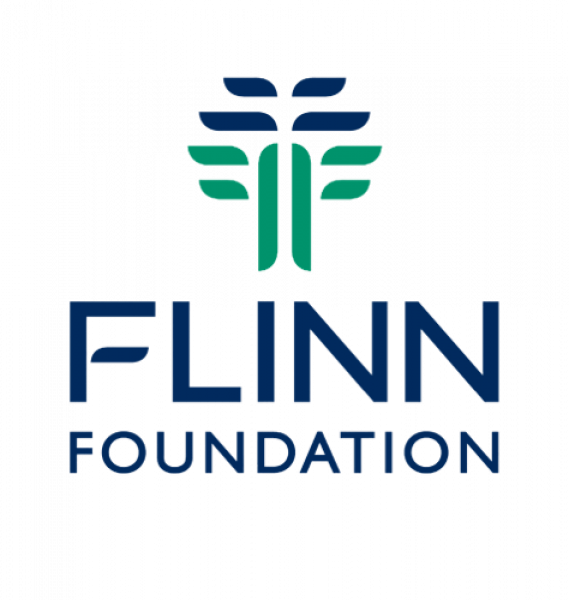
Job Title | Generic Lab
Lab Boss
Lorem ipsum dolor sit amet, consectetur adipiscing elit, sed do eiusmod tempor incididunt ut labore et dolore magna aliqua. Ut enim ad minim veniam, quis nostrud exercitation ullamco laboris nisi ut aliquip ex ea commodo consequat. Duis aute irure dolor in reprehenderit in voluptate velit esse cillum dolore eu fugiat nulla pariatur. Excepteur sint occaecat cupidatat non proident, sunt in culpa qui officia deserunt mollit anim id est laborum.
LinkedIn
2022 PMI Awards Ceremony
Celebrate our Undergraduates
Pathogen & Microbiome Institute congratulates our undergraduate researchers as well as this year’s Keim Award recipients.
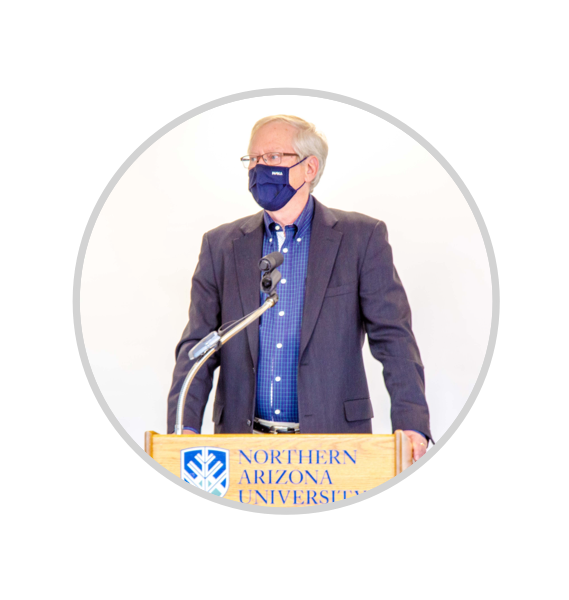
2022 Awards Host
Dawn Birdsell
Associate Director of Training and Education
Join our Team
With the focus on developing the next generation workforce, Dawn designs and organizes hands-on science training programs for PMI undergraduates. These programs foster foundational skills essential for career success.
PhD Student
Morgan Hughes
During her PhD at PMI, Morgan will combine her experiences in bat research, genetic research and tropical dry-forest conservation.
She will be investigating the seasonal dynamics and landscape ecology of bat communities in the highly fragmented Tumbesian and Marañon dry-forests of Peru. After more than a year sampling the bat communities in protected areas across four regions of Peru, she will compare the seasonal changes, habitat use and genetic differentiation to understand how bats cope with seasonal drought in this highly fragmented landscape. The results will help identify critical habitats and ecological corridors.
She will work directly with government agencies and nonprofits to ensure that the results can be directly applied to improve conservation in the region. Following her PhD she hopes to continue research in Latin America.
Undergraduate Research Assistant
Dustin Mullaney
Dustin is an NAU graduate who worked at PMI with Dr. Naomi Lee on developing a novel HPV vaccine which seeks to broaden coverage and improve immunogenicity compared to the current vaccine in order to better protect the Native American community.
LinkedIn
He is now working with Dr. Chittiboina and his team to profile the tumor microenvironment of pituitary adenomas. He also implemented computational methods to improve speed and objectivity of analysis.
Species from Feces
Genetic ID Services
Species from Feces offers a wide range of species identification services to further wildlife research, management, and conservation globally.
Click for Services
Our unique research genetically identifies bats, and diets of herbivores or insectivores. From bridge maintenance to wind energy to important roosts, we’ve helped wildlife managers and researchers get the data they need to make ecologically sound decisions for their projects.
Click below to find out more information about our genetic ID services.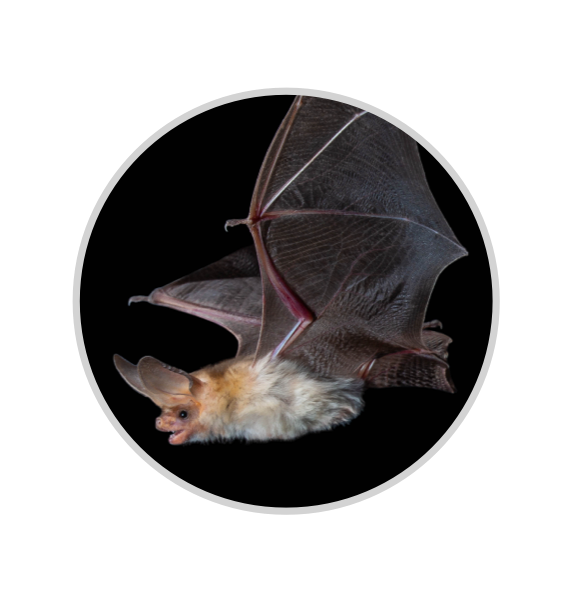
Keim Award Runner Up
Bethany Robinson
Under Dr. Ricky Camplain at the Center for Health Equity Research and Southwest Health Equity Research Collaborative, Bethany has conducted research on the physical activity levels of incarcerated females and modeled the spread of COVID-19. In Spring of 2021, she was awarded with the 2021-2022 Hooper Undergraduate Research Award for her project “How Disability Status Affects Incarcerated Female’s Recreational Time Attendance and Utilization at a Rural Jail”. That same semester she was also recognized with the award for Excellence in Undergraduate Inquiry and Creativity from NAU’s Office of Undergraduate Research and Creative Activity. Upon graduation, Bethany will be attending the Arizona College of Podiatric Medicine where she plans to continue her involvement in research at the graduate level.

Undergraduate Researcher
Get Research Experience
The French Lab is recruiting for Undergraduate Researcher. It’s a paid position, working on the investigation of environmental correlations of the presence/absence and virulence of Burkholderia pseudomallei.
French Lab Undergraduate Duties:- Inventory and organize lab supplies
- Enter sample data into excel spreadsheets, double check all entries to ensure accuracy
- Maintain detailed lab notebook
Assist with lab work including:- Culturing and quantifying Borrelia burgdorferi
- Perform Minimum Inhibitory Concentration (MIC) assays
- Perform Minimum Bactericidal Concentration (MBC) assays
- Perform Fractional Inhibitory Concentration (FIC, also known as checkerboard) assays
- Soil DNA extractions in biosafety cabinet
- Maintain sample organization
- Sample and reagent inventory, management, and organization
- DNA extractions
- Soil physiochemical assays
- High throughput sequencing library preps to understand soil microbial community composition
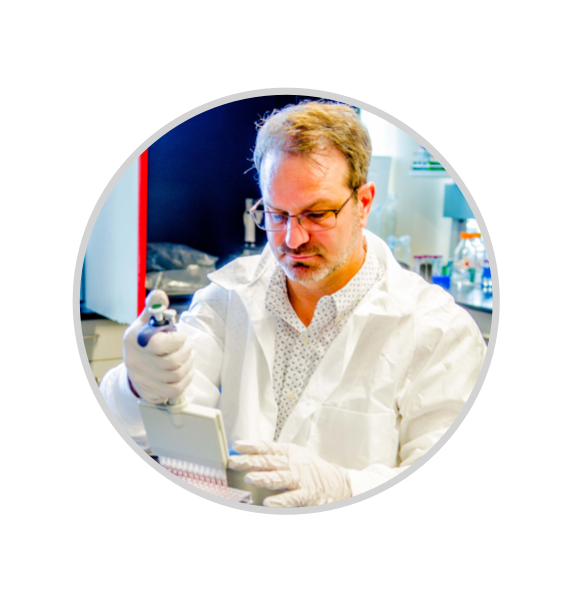
PhD Candidate
José Martínez-Fonseca
José’s research focuses on improving our understanding of anthropogenic effects on wildlife at the landscape and species level. He uses landscape analysis and DNA metabarcoding to shed light on the ecology and habitat requirements of understudied bat species in the Neotropics.
LinkedIn
Working in Dr. Faith Walker and Dr. Carol Chambers’ Bat Ecology and Genetics Lab, he was trained in lab techniques to process samples collected in Nicaragua. Moving forward, he will apply these techniques to other taxa, such as amphibians and reptiles, terrestrial mammals, and birds.
Undergraduate Researcher
Meagan Owens
As an undergraduate researcher majoring in biology with a minor in chemistry, Meagan is working towards earning a Wildlife Ecology and Management Certificate. Passionate about wildlife conservation, her position within the Walker Lab includes work on Species from Feces program with the Bat Ecology and Genetics Lab.
LinkedIn
Her research includes Sanger Sequencing for bat IDs using DNA extracted from bat fecal matter, bat tissue, and the environment. She also manages public and client outreach as the manager for the lab’s marketing campaigns.
Following her undergraduate career, she’s aiming for a master’s degree in wildlife biology to pursue a career in wildlife conservation and management.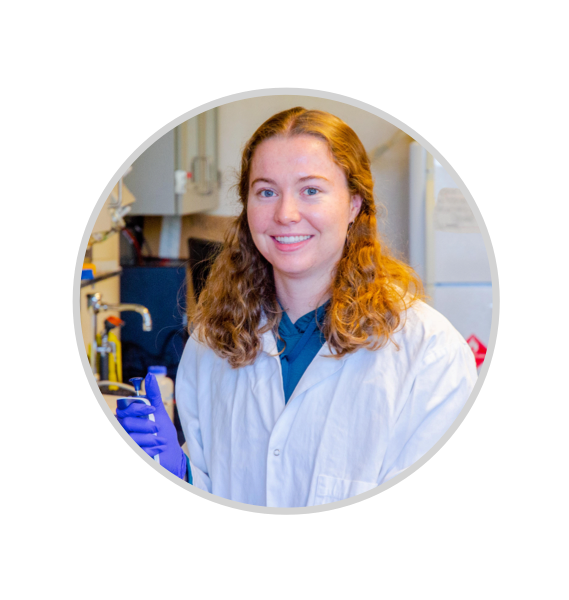
Comic Relief
Mad Magda
Magda joined the Species from Feces team to save the world one poo pile at a time. It’s hard to believe how much information is in scat. The DNA Magic Machine can identify species, diet, and disease, all from a tiny pellet of doo. The research can even tap into loose genes floating in the air, water, and land.
Species from Feces
As a spokesperson, Magda presents these marvels from her unique comical perspective. She’s not mad… just crazy about science.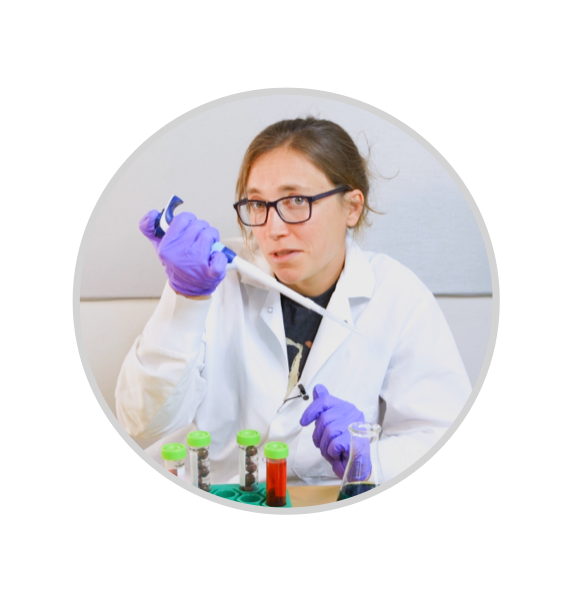
Undergraduate Research Assistant
Rebecca Ballard
Rebecca is currently a senior at NAU, majoring in Biomedical sciences with a minor in Psychology. As an undergraduate research assistant, she studies pathogens such as Yersinia pestis (Yp), the causative agent of plague, and Francisella tularensis (Ft), which causes Tularemia. Her efforts focus on characterizing genes that are thought to be important for the survival of Francisella tularensis, as well as developing molecular tools to perform high resolution genetic analysis on complex plague samples. After graduating, she plans to continue her education at NAU as a graduate student for the Master's in Biology program.
LinkedIn
Win $2,000 of free analysis
Enter our contest and win free analysis for your project. The winner will be announced on International Bat Appreciation Day (April 17th).
Click to Enter the Contest
Our unique research genetically identifies bats, and diets of herbivores or insectivores. From bridge maintenance to wind energy to important roosts, we’ve helped wildlife managers and researchers get the data they need to make ecologically sound decisions for their projects.
To enter, click below for entry form and tag @speciesfromfeces on your social media.
Genetics is the answerWhatever your needs, contact our team to see if we can use the latest genetic technology to get answers for your wildlife project.
Get Started with Us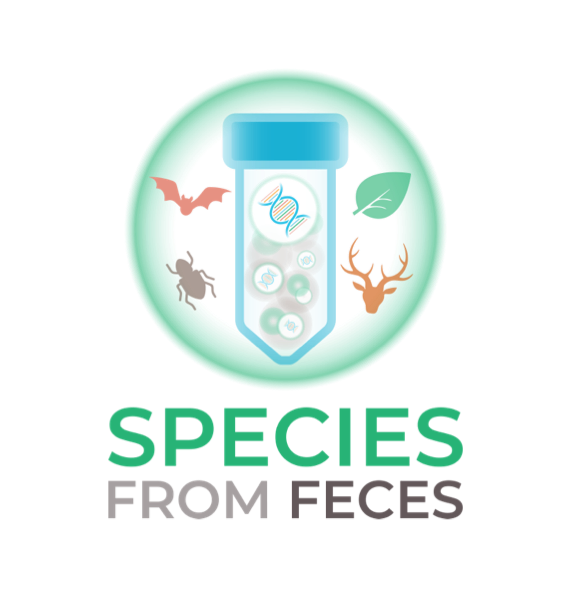
Emma Froehlich
Research Technician
Emma is a Research Technician working on rabies detection along with identifying species, diet and pathogens through feces of bats and other wildlife. Additionally, working on white nose syndrome and avian malaria to map distribution.
Walker Lab
Undergraduate Research Assistant
Anthony Zapata
Anthony is an undergraduate student that worked on multiple projects while in the French Lab. He explored different treatments to the SARS-CoV-2 virus using cell culture, and analyzed the treatments across multiple different strains. He also investigated the environmental correlations of the presence/absence and virulence of Burkholderia pseudomallei.
LinkedIn
Using his unique experience at PMI as a public health student, Anthony is moving on to human-based public health research. After his time at NAU, he plans to go on to attend graduate school to obtain an MPH in Epidemiology and work to explore the spread of disease across populations around the world.
Undergraduate Research Assistant
Emma Federman
Emma is an undergraduate research assistant majoring in Biomedical Science and minoring in Psychology. Her research has focused on using genetics to monitor a threatened snake species and applying a new non-invasive method to identify rabies virus. The mentorship and lab experience Emma is gaining from PMI will help her future career in genetics.
LinkedIn
The USGS National Wildlife Health CenterThe USGS National Wildlife Health Center is the only federal science center dedicated to wildlife disease detection, control, and prevention in the United States. Our mission is to advance wildlife health science for the benefit of animals, humans, and the environment. The NWHC provides information, technical assistance, and research on national and international wildlife health issues. We monitor and assess the impact of disease on wildlife populations; define ecological relationships leading to the occurrence of disease; transfer technology for disease prevention and control; and provide guidance, training and on-site assistance for reducing wildlife losses.
USGS.gov
Biologist
Get Work Experience
We are looking for two candidates to work on zoonotic disease surveillance in wildlife.
How to Apply
The positions are offered as federal term-limited biologists in the general schedule at levels 11 or 12 (short hand, this is GS-0401-11/12 TERM). This generally means you need a master’s or PhD in biological sciences (if master’s, then relevant experience is used to meet the grade level requirements). TERMs are 13 month appointments that can be extended up to 4 years. The positions will report to the Chief of the Ecology and Epidemiology Branch.
The primary duties will be:
- Coordinate national surveillance for zoonotic diseases in wildlife
- Review and synthesize existing literature on zoonotic diseases
- Build and maintain partner relationships (One Health and wildlife specific) around national surveillance programs
- Manage the entire life cycle of the project from planning, implementation, coordination, data management and analysis, and through communication of result
- Analyze scientific data resulting from national surveillance activities
- Communicate results and impacts of national surveillance activities to broad audiences including the public, other health sectors, and wildlife managers
- Write scientific and informational products
- Participate as an epidemiologist in opportunistic morbidity and mortality surveillance and outbreak investigations
- Implement high quality data management practices, including quality control and assurance within NWHCs laboratory information management system and wildlife health information sharing partnership - event reporting system (whispers.usgs.gov)
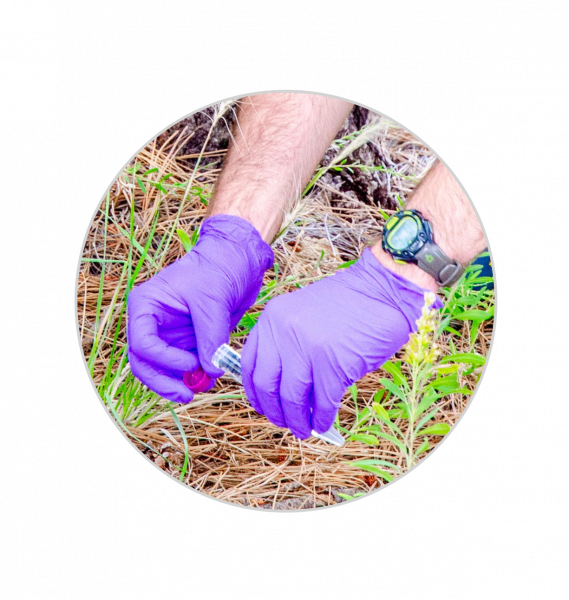
How to Apply
The award will be made annually in the Spring Semester with a committee assembled by the Office of the Vice President of Research and PMI. All NAU undergraduate students involved in hypothesis-driven scientific research with promise for future research careers are eligible.
Click to Email Documents
Two confidential letters supporting the application should be sent by mentors directly to PMI@nau.edu by March 1st. These letters should describe their professional collaboration, the student’s research experience, contributions, outcomes, and potential.
Applicants submit a letter outlining undergraduate research experience, contributions, and their hopes for a scientific research career. 2-page (or less) letter format in 12 point font, signed and include contact information as well as names of your two letter-writing mentors.
Include supporting documentation such as scientific papers they have authored or co-authored, grant proposals they have written, abstracts of their research presentations, posters, awards, transcripts, CV’s.
Submit a single pdf to the PMI administrative staff (PMI@nau.edu) and addressed to the Keim Award Committee.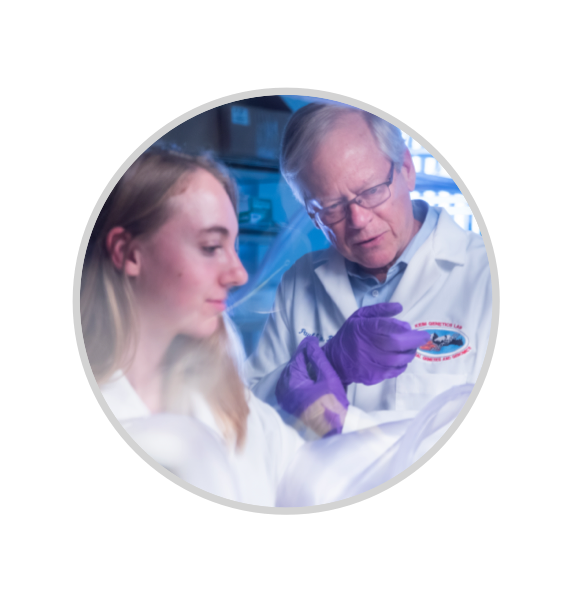
SharePoint LinksUse these links and your individual login to access SharePoint
BSL2 SharePoint BSL3 SharePoint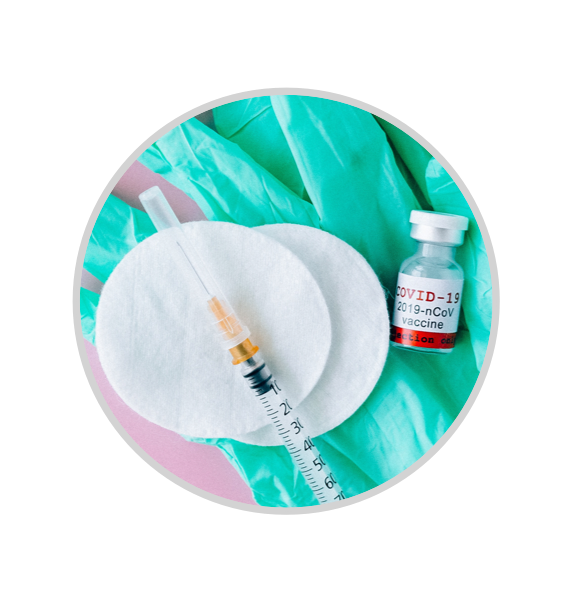
Join Us
Daniel Sanchez’s Dissertation Defense Seminar
Launch Meeting
Monday 11/22/21 2:00PM Arizona
ID: 835 7214 9192
Password: dna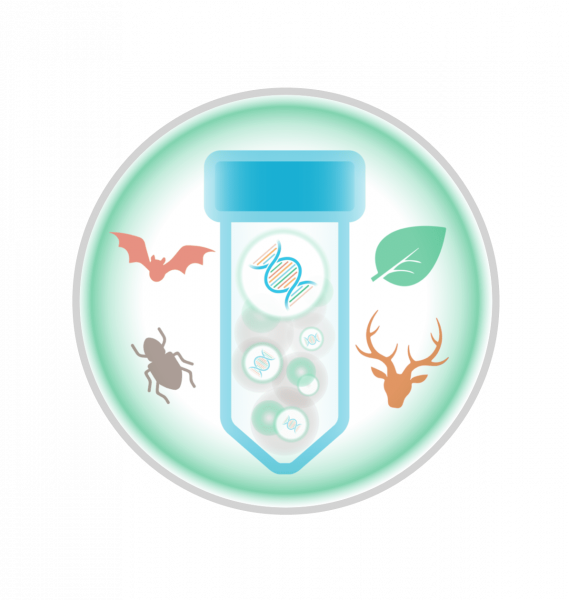
Walker Lab
Using trace DNA to study wildlife ecology and disease.
PhD Candidate
Dan Sanchez
After helping develop Species from Feces in the laboratory, Dan researched the historical biogeography of the spotted bat and designed a DNA metabarcode assay for identifying diet of the endangered New Mexico meadow jumping mouse.
LinkedIn
Awarded an NSF graduate research fellowship, he is skilled in next-generation sequencing, microbiome bioinformatics, phylogenetics, ecological niche modeling, and bacterial and fungal microbiology.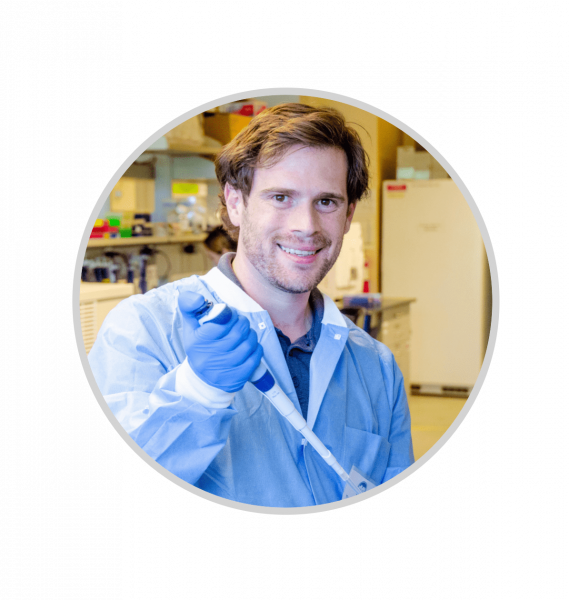
Undergraduate Researcher
Jessica Marshall
Jessica is an undergraduate research assistant studying Biomedical Science with minors in Chemistry and Psychology. Her research focuses on Multiple-Locus VNTR Analysis of Yersinia pestis, the bacterium that is the causative agent of plague. Working in a lab environment has helped her identify a passion for research and prepare her for her medical research career.
LinkedIn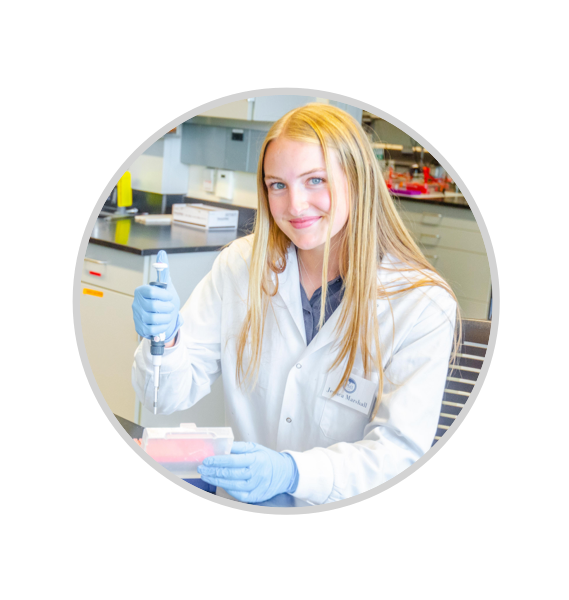
Contact UsIf you are interested in working on our team with basic and applied research focused on vertebrate and pathogen genetics, contact us.
More Info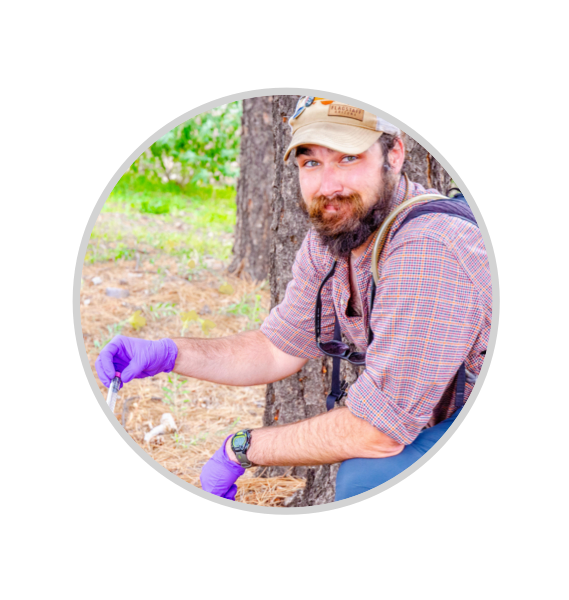
Protective Gear
Suiting up is a critical part of pathogen research
Kaitlyn Schools Bad UndergradThe very patient Kaitlyn takes a moment to review the lab’s safety procedures. Take a look at what Bad Undergrad learns in these masterclass tutorials.
More Bad Undergrad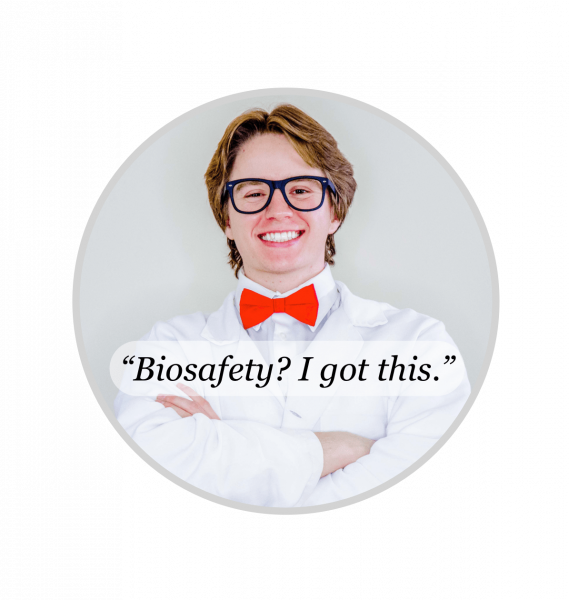
Stay Informed
Sign up for our Newsletter
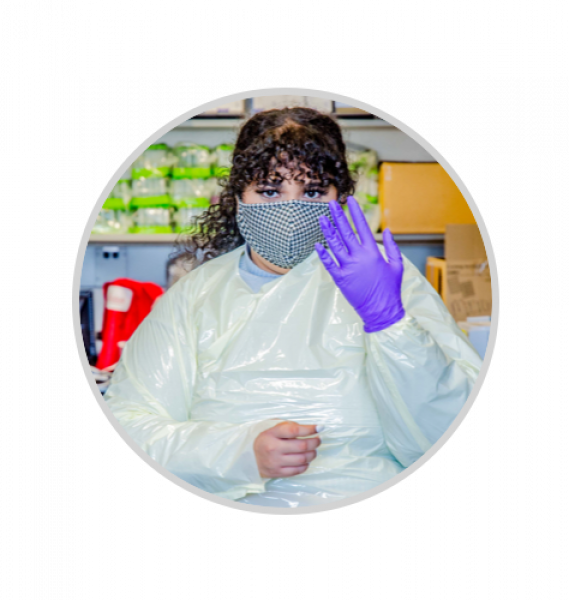
Undergraduate Researcher
Matthew Morales
Matthew is an Undergraduate Researcher studying Microbiology with a minor in Chemistry. His work focuses on maintaining the hACE2 mouse colony for the HCMMC. The hACE2 murine model advances the understanding of disease progression of COVID-19. Working in Dr. Barker's Valley Fever Lab and the HCMMC has contributed to Matthew's readiness in pursuing medical school.
LinkedIn
Get Vaccinated
Covid PSA
Undergraduate Researcher
Noor Saeed
Noor is an Undergraduate research assistant studying Biomedical Science with a minor in Chemistry. Her research focuses on antimicrobial resistance mechanisms of Burkholderia pseudomallei, a bacterium that has the potential for bioterrorism. PMI’s hands-on training in a lab environment has prepared her for a career in dentistry.
LinkedIn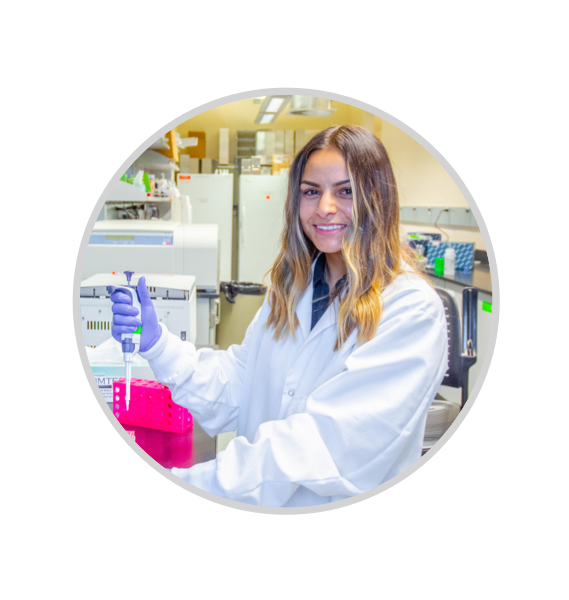
Research Technician
Do Exciting Research
We’re recruiting for a Research Assistant for basic and applied research focused on vertebrate and pathogen genetics.
You’ll be working with Faith Walker’s Lab on the Species from Feces program.
Minimum qualifications: Bachelor's degree in Biology or related field
Preferred qualifications: Master's degree and/or 2-4 years of genetics experience
Primary duties:- DNA extraction from wildlife fecal samples and other sample types
- Next-Generation library preparations
- PCR/qPCR sample screening
- Experiments in a BSL2 environment
- Hands on training working with a team
- Handling potentially hazardous materials safely, such as laboratory chemicals and disease-causing organisms
We’re looking for folks experienced with:- Genetic techniques such as DNA extraction, PCR, qPCR, Sanger sequencing, library preparation for next-generation sequencing, and targeted enrichment
- Laboratory safety including handling biohazardous materials and laboratory chemicals
- Pre-exposure rabies vaccinations
- Principles and techniques used in molecular genetic analysis
- Data entry and analysis of scientific data
- Working with a laboratory group and mentoring undergraduates in lab techniques
- Microsoft Access
- Organizational skills with an eye for detail
- Good verbal and written communication skills
- Promoting a diverse, inclusive environment

Principal Investigator Walker Lab
Faith Walker
Faith Walker is an Associate Research Professor in the School of Forestry and an Associate Director of PMI for heading the Ancient DNA Core. Her lab uses trace DNA to study wildlife ecology and disease.
LinkedIn Website
#SafeSemesterNAU
Stop the Spread
With Omicron Variant infections on the rise, the best way to protect yourself and your community is to mask up and get the shot.
Get Vaccinated Get the Booster
NAU Press Release
Let’s get the word out for Dave Wagner’s important research on the Transmission of antimicrobial resistant Yersinia pestis during a pneumonic plague outbreak.
Read Article
Decades of Excellence
Alan Dale Retires
Alan Dale retires after 27 years at NAU, 20 years at PMI, building the institute's security and infrastructure from the ground up. His extensive experience in computer science has been a huge part of our advanced pathogen research.

Coronavirus Vaccine
#GetVaccinated
Executive Director of the Pathogen and Microbiome Institute at NAU, Dr. Paul Keim urges everyone to get the Coronavirus Vaccine available at the NAU Fieldhouse.
Schedule Vaccine
2021 PMI Awards Ceremony
Celebrate our Undergraduates
Pathogen & Microbiome Institute congratulates our undergraduate researchers as well as this year’s Keim Award recipients.
About the Keim Award
On-the-Job Experience
Join PMI for your Career
The Pathogen & Microbiome Institute is seeking Undergraduate Assistants for research in life sciences and bioinformatics analysis.
Click Here to Apply
Be a part of:
• Hands On Training
• Cool Experiments
• Scientific Publications
• Professional Mentorship
• Network Building
Principal Investigator | Cope Lab
Emily Cope
Emily Cope is an Assistant Professor in Biological Sciences and Assistant Director for the Center for Applied Microbiome Sciences at the Pathogen and Microbiome Institute. Her lab focuses on the role of the microbiome in chronic and progressive diseases.
LinkedIn
Meet the Director
Christopher T. French
Assistant Professor, Assistant Director PMI, Director CTSC
LinkedIn
As Principal Investigator of the French Lab, Dr. French coordinates the activities of the CTSC and is an expert in host-pathogen interactions. He received his Doctorate and postdoctoral training in bacterial pathogenesis from the University of California Los Angeles. His independent research is focused on pathogenic mechanisms, ecology and developing new therapeutics for infectious diseases.
Meet the Director
Bridget Barker
Director of HCMMC & Associate Professor
LinkedIn
Associate Professor in Biology, Bridget oversees the HCMMC facility and supervises in vivo COVID-19 research effort and specialized in Coccidioides research.
Professor Barker completed her Ph.D. in population genomics and ecology of Coccidioides at the University of Arizona in Tucson. She has returned to working on Coccidioides, expanding from the previous genomics work into transcriptomics, both in vitro and in vivo, to understand gene expression changes over the course of infection, as well as the morphological shift from mycelia/arthoconidia to spherules. Professor Barker is also interested in developing methods to detect Coccidioides in soil. Current funding is NIAID R21grant (sexual cycle in Coccidioides), a ABRC new investigator grant and PGP grant (Cocci DNA detection in soil development project) through NAU.
2020 Keim Award Honorable Mention
Camilla Checinski
Senior Undergraduate Researcher, Camilla Checinski works as an environmental, analytical chemist, quantifying metal contaminants in rodent fur and human hair from Yuma, Arizona; majoring in Chemistry and Criminology & Criminal Justice with a minor in Social Science Forensics.

2020 Keim Award Winner
Kyle Ghaby
Kyle Ghaby pursues biochemical and biophysical information on the molecular scale. He has expertise in computational chemistry methods, such as adaptively biased molecular dynamics, steered molecular dynamics, and umbrella sampling, as well as molecular biological methods, such as western blots, guide RNA synthesis, and embryonic microinjections.
LinkedIn Email
Thank You Donors
We really appreciate all the generous sponsors that make the Keim Award possible.
Donate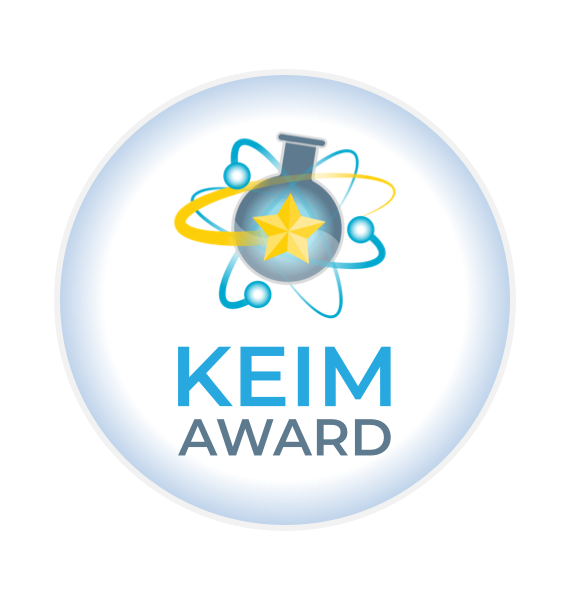
Excellence in Research
Keim Award
Established by Paul and Jenny Keim in 2020, the Keim Award for Excellence in Undergraduate Research is designed to reward excellence in research by outstanding NAU students during their undergraduate studies, to reward student dedication and leadership to the pursuit of future research, and to encourage the participation of students in research endeavors.
Donate
2020 Winner
Congrats Kyle
We are pleased to announce that the recipient of the 2020 Keim Award for Excellence in Undergraduate Research (Keim Award) is NAU undergraduate, Kyle S. Ghaby! Kyle is a senior majoring both in biomedical science and chemistry and minoring in mathematics.

Science History Podcast
Episode 15. Bioterrorism
Website
Shortly after the al-Qaida terror attacks of September 11, 2001, a second wave of terror swept the United States – this time bioterrorism with anthrax mailed in letters as the weapon. Today my guest is Paul Keim, the scientist who conducted the genetic sleuthing and tracked down the source of the anthrax. Paul is the recipient of numerous scientific honors, and he is a professor of biological sciences at Northern Arizona University, where he directs the Pathogen and Microbiome Institute. In addition to the anthrax terror attacks, in today’s episode we discuss the Soviet and Iraqi anthrax weapons programs, the Haitian cholera outbreak sourced to Nepalese peacekeepers, virulent avian influenza, Scottish heroin addicts, and the Japanese doomsday cult Aum Shinrikyo.
Give and Share
Spread the Word
Get involved by Donating and Sharing to help promote our 24 hour fundraising event.
Join Giving Day
Excellence in Research
The Keim Award
Established by Paul and Jenny Keim in 2020, the award recognizes outstanding NAU undergraduate research.
Donate to Keim Award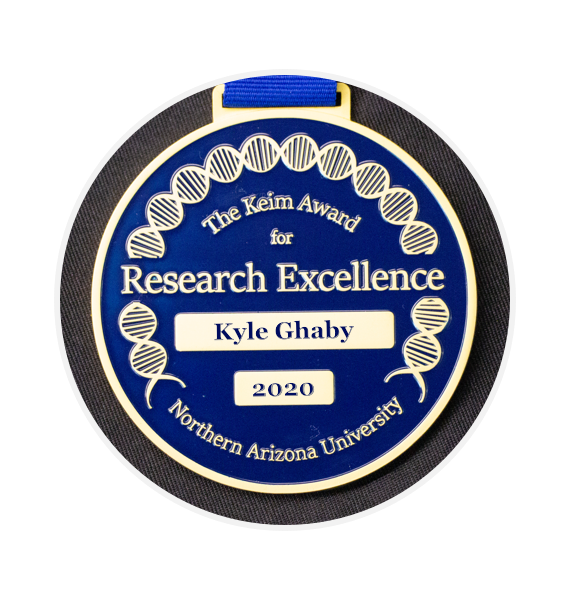
Join the Challenge
On Giving Day April 14th, donate to “Challenge for Undergraduate Research”
Giving Day Challenges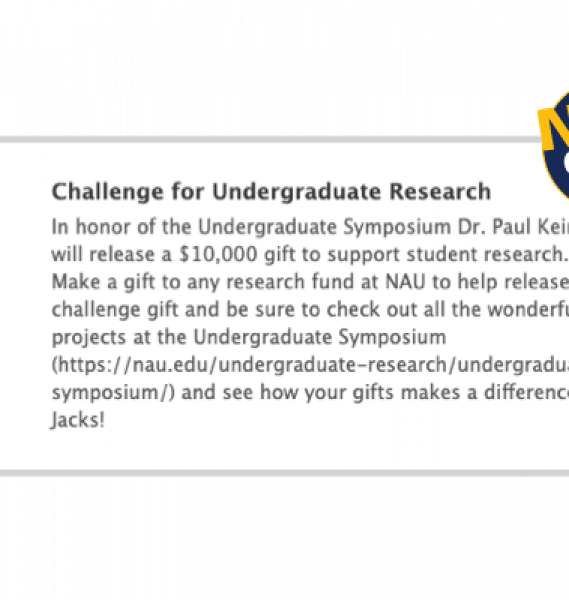
Associate Director of Training and Education
Dawn Birdsell
With the focus on developing the next generation workforce, Dawn designs and organizes hands-on science training programs for PMI undergraduates. These programs foster foundational skills essential for career success.
LinkedIn
Research Assistant
Sierra Jaramillo
Sierra works for the CTSC, leading in vitro experiments on potential COVID treatments.
LinkedIn CTSC
Laboratory Research Facility Admin Manager
Roxanne Nottingham
After working at PMI as an undergraduate researcher, Roxanne graduated from NAU with a degree in biology and became a full time staff member in 2009. Her main duties include maintaining compliance in the PMI SA BSL3 Facility, contributing to various projects in bacterial select agent research and testing COVID-19 treatments for the CTSC.
LinkedIn
Publication in mBio Journal
Stenoparib, an inhibitor of cellular poly (ADP-ribose) polymerase (PARP), blocks replication of the SARS-CoV-2 and HCoV-NL63 human coronaviruses in vitro.
Read mBio Journal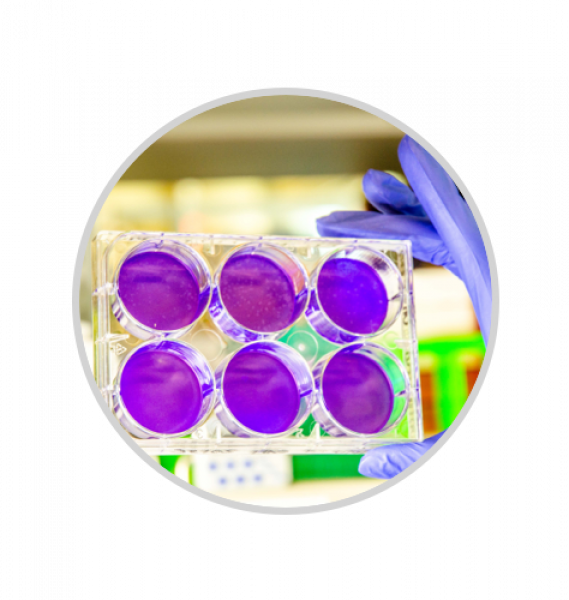
Who is Bad Undergrad?
Meet Nolan Hook
He’s an Undergrad working towards a Digital Marketing Degree. With zero acting experience, how did he do such a great job on these videos? He’s got years of training on what not to do, and the scars to prove it.
LinkedIn
 What Not To Do
What Not To DoBad Undergrad
If you want to join our illustrious team of top notch researchers, this guy is here to show you What Not To Do.
Tag along on his wild ride to be a part of the PMI team.
Join a Socially Distanced Visit to our Lab
Look, it’s a pandemic, and we just can’t do the same stuff like we used to. It doesn't mean we should put our education on hold. Come visit our state of the art research facilities and learn about a future in science.

Video | Social Media | Marketing
Get Work Experience
Is this a good fit?
Pretty much, I need someone who knows how to Google a solution and implement it. Say, we need closed captioning on our videos. You’d search "How to close caption", watch YouTube videos, then run a speech to text on the audio track. I’d give you login to our Vimeo account and you’d ask me to check it after it’s done. Simple, right?
You’d probably learn how to:
• Admin our Wordpress theme
• Use a complex Sketch file
• Produce marketing videos
• Optimize posts for SEO
Details
This position is open to NAU students. I believe there’s a max of 30 hours a week. Rate based on experience. You'd be a promising candidate if you know how to write. It'd be good if you aren't a stranger to HTML/CSS.
Okay, I want in.
Well, send me a cover letter with your resume, bug me for a convo and we’ll discuss.
Ken Ng | Creative Director of PMI ken.ng@nau.edu LinkedIn
Associate Director of PMI
Dave Wagner
Wagner is a disease ecologist whose primary research interests are the ecology and evolution of infectious diseases. He uses genetic and genomic variation within pathogen, vector and host species to better understand the distribution, ecology, evolutionary history, and transmission patterns of infectious diseases. Wagner, who has published more than 140 articles in scholarly journals, is one of the world’s leading experts on several pathogens and infectious diseases, including plague and tularemia.
Google Scholar LinkedIn
Executive Director of The Pathogen & Microbiome Institute
Paul Keim
PMI has recruited world class scientists in genomics, infectious disease, computational analysis, bioinformatics, and microbiome research. They work together with NAU students in the state-of-the-art Applied Research & Development building. This building was awarded Platinum LEEDs status as one of the greenest buildings in the world. It provides a warm, interactive, and productive environment for students and faculty.
LinkedIn
PMI attracts and trains Arizona’s brightest and mostly highly motivated students. They form teams with faculty and participate in a wide range of disciplines where computer science meets microbiology, in the context of ecosystems and evolutionary principles.
PMI scientists have been highly successful at obtaining research funding and this provides the support for cutting edge research and paid internships.
Research AssistantKaitlyn Parra
Research Assistant working on novel fungal species closely related to known human and mammalian pathogens. The goal is to elucidate their role in the environment and relationship with mammals in the region.
LinkedIn
NAU Graduate
PMI Research AssistantAdriana Avery
Adriana studied the basics of practical computing for biologists, learned how to analyze bacterial genomic sequences using computational tools, such as NCBI Blast and Mauve Align which edit genomic sequences so that researchers can understand and interpret DNA sequences. She studied how to review literature on the bacteria, Rickettsia sp., in order to understand the fundamentals of scientific writing style.
LinkedIn
Her experience at PMI is helping her future in the healthcare industry and gave her the necessary skills to become a medical scribe.
Undergraduate Researcher
George Testo
After working at TGen North as a summer internship as a Helios Scholar, George continues his research in the Cope Lab. With NIH grant known as RISE (Research Initiative for Scientific Enhancement), he hopes to use this outstanding support to help patients suffering from chronic rhinosinusitis (CRS) and or cystic fibrosis (CF), while he writes his undergraduate thesis.
LinkedIn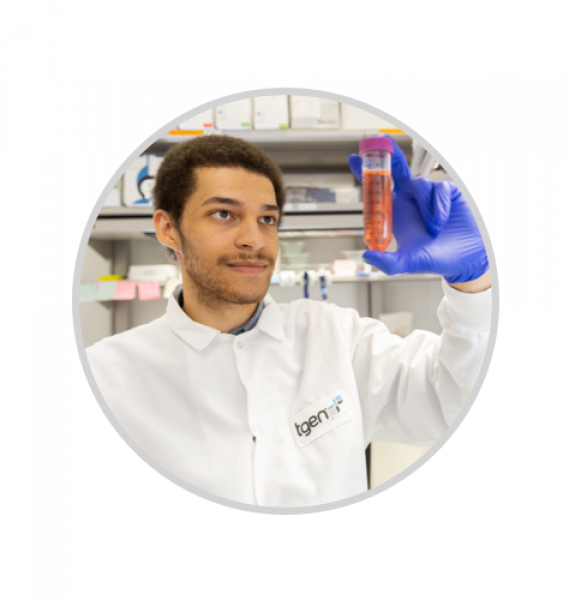
Director of HCMMC / Associate Professor in Biology
Bridget Barker
Associate Professor in Biology, Bridget oversees the HCMMC facility and supervises in vivo COVID-19 research effort and specialized in Coccidioides research. Professor Barker completed her Ph.D. in population genomics and ecology of Coccidioides at the University of Arizona in Tucson. She has returned to working on Coccidioides, expanding from the previous genomics work into transcriptomics, both in vitro and in vivo, to understand gene expression changes over the course of infection, as well as the morphological shift from mycelia/arthoconidia to spherules. Professor Barker is also interested in developing methods to detect Coccidioides in soil. Current funding is NIAID R21grant (sexual cycle in Coccidioides), a ABRC new investigator grant and PGP grant (Cocci DNA detection in soil development project) through NAU.
LinkedIn HCMMC
Manager of ABSL3 Facility
Heather Mead
PhD Candidate in Biology, Heather manages day-to-day operations in the ABSL3 and facilitates smooth workflow, compliance with biosafety protocols and training of new staff.
LinkedIn HCMMC
Undergraduate Researcher
Breezy Brock
Under the supervision of Dr. Crystal Hepp and Dr. Viacheslav Fofanov at the Pathogen and Microbiome Institute, Breezy participates in various projects studying the prevalence, movement, and evolution of pathogens such as West Nile Virus (WNV), Rabies Virus, COVID 19, Staphylococcus aureus, Streptococcus mutans, and Streptococcus sobrinus. Upon graduating from NAU, she plans to become a board-certified veterinary pathologist with a Ph.D. in Microbiology and conduct research on host-pathogen interactions at a cellular level in animals and humans to develop new means for disease prevention.
LinkedIn
Get Hands On Experience
Apply to be a Research Assistant
Pathogen & Microbiome Institute (PMI) at NAU is an internationally recognized research facility focused on developing technologies to better understand and manage pathogens that affect humans and wildlife.
Apply Now
PMI is committed to the professional development of undergraduate student employees and accept students from diverse departments (Biology, Chemistry, Computer Science, Business). Students in our program work on exciting research projects or provide logistical support (business office, and IT) under the careful mentorship of faculty professors, staff scientists, and associate directors.
There are over 100 faculty, full time staff, graduate and undergraduate students currently conducting research at PMI. Don’t miss this opportunity to learn more to possibly expand your horizon.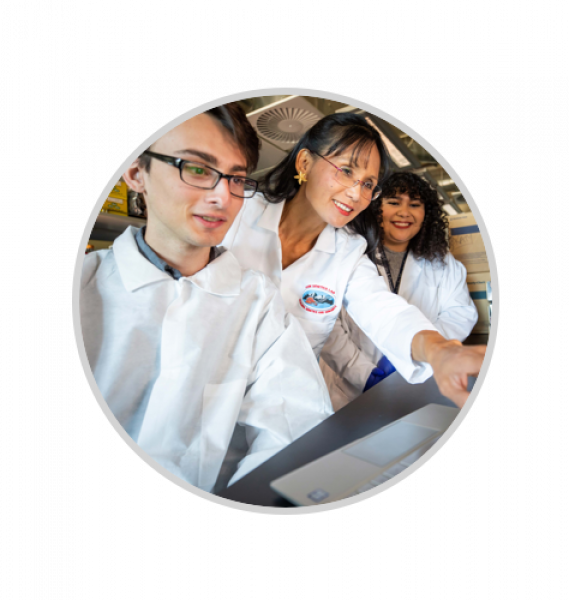
The Pathogen and Microbiome Institute
The Pathogen and Microbiome Institute (PMI) is a research unit at NAU that spans departments and colleges to gather infectious disease and microbiome scientists into a single multi-disciplinary environment. The joint efforts span computational, genomic, microbiology, immunology, and public health disciplines to generate synergy that can’t be achieved within academic silos. The world-class science makes for an ideal training environment for students to achieve their personal professional goals. PMI is closely associated with TGen North, with whom the institute shares infrastructure to maximize Arizona’s investment in science.
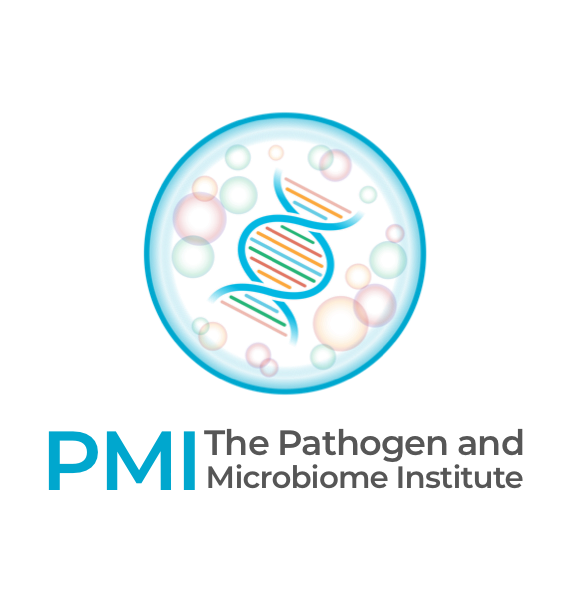
-
Research Professor
Faith Walker
Dr. Faith Walker delivered the keynote address for the 69th Annual Scientific Meeting of the Australian Mammal Society in Adelaide, South Australia. She spoke about her 30 years of studying the southern hairy-nosed wombat, her team’s work with environmental DNA to detect endangered species of bats, and their venture into airborne DNA to describe biodiversity. A live wombat was in attendance. She was joined at the conference and in the field by PMI alumnus Colin Sobek, who is a Ph. D. student at the University of Adelaide applying genomic tools to the critically endangered northern hairy-nosed wombat.
Walker Lab
-
Executive Director | PMI
Paul Keim
On October 6, 2023 we gathered at our annual All-Hands meeting to celebrate and recognize staff, faculty, students, and all current and recent projects we’ve accomplished here at PMI! Our annual meeting included a presentation on my recent sabbatical to Oxford, England and updates from the PMI leadership team on the endeavors of our labs. The students at PMI are the foundation that we build upon as PMI continues to conduct outstanding research, working to make an impact on the world. Enjoy our All Hands video as we share our projects with you.

-
Undergraduate Research Assistant
Kayla Ramirez
With my background of a supportive family, my fascination in all things biology has grown into the research career I have today. I am so grateful for the pathogen and infectious disease skillset that has been fostered in working with the Pearson Lab. Staphylococcus aureus is my research passion. I am tasked with determining the prevalence of staph to mitigate infections. Taking all of the experience I have gained at PMI, I am moving forward in my career by pursuing a medical degree and clinical research.
LinkedIn
-
Undergraduate Research Assistant
Reanna Bourgeois
Reanna Bourgeois, a Microbiology major at Northern Arizona University focuses her research on two tick-borne disease projects.
LinkedIn
Reanna’s research evaluates Rocky Mountain Spotted Fever in Rhipicephalus sanguineus ticks in southern Arizona. Secondly, she tracks the movement of cattle fever ticks (Rh. microplus and Rh. annulatus) in southern Texas while assessing their acaricide (insecticide) resistance.
Reanna is passionate about infectious disease research feeding into prevention and control as she aims to make meaningful contributions to public health. Her goal is to further advance her experience as a scientist through translational infectious disease research.
2023 Awards Host
Dawn Birdsell
Associate Director of Training and Education
Join our Team
With the focus on developing the next generation workforce, Dawn designs and organizes hands-on science training programs for PMI undergraduates. These programs foster foundational skills essential for career success.
Associate Director – Finance and Business Operations Core
Deborah Martin
Deborah “Debbie” Martin has many years of experience working at Northern Arizona University. She is an accomplished musician, playing the guitar, the violin, the organ, the piano, and voice. She holds a degree in music education; however, she enjoys serving at PMI as the associate director of the finance and business operations core. Her responsibilities in PMI entail everything other than science. Debbie is a two-time recipient of the NAU President’s Achievement Award. She came to PMI in 2010, after working in the Department of Geography, Planning and Recreation (GPR) for 16 years. Her strengths are personnel, human resources management, and finance. She prides herself in being a good steward of the funds entrusted to PMI and leads the admin team with a desire to support and encourage PMI research teams, as they strive to make a difference in our lives and in the world in which we live. She desires to provide exemplary service to the University and the Institute and does so with finesse.
LinkedIn
Undergraduate Research Assistant
Derek Lake
Derek is currently pursuing a BS in Biomedical Science with a minor in Chemistry and Certificate in Biotechnology with a putative completion date of May 2023. He is interested in entering the Multi-Omic (Bioinformatics/PGx/Genomics/Microbiome) field with particular interest in long-read sequencing and Machine Learning-Assisted GWAS for variant curation and interpretation within Precision Genomic Medicine.
LinkedIn
CDC Podcast
Burkholderia thailandensis Isolated from the Environment
CDC Podcast
Dr. David Wagner, a professor at the Pathogen and Microbiome Institute at Northern Arizona University, and Sarah Gregory discuss the detection of Burkholderia thailandensis in the environment in the United States.
Undergraduate Research Assistant
Holly Hansen
Holly is an undergraduate research assistant double majoring in Microbiology and Chemistry and minoring in Mathematics. Her research focuses on analyzing water samples from various water sources on the Navajo Reservation to determine the presence of Helicobacter pylori, the bacteria that causes gastric ulcers.
LinkedIn
Some of Holly's other research interests include immunology, virology, and public health. Her experience working at the Pathogen and Microbiome Institute has prepared her to pursue a career in science.
PhD Student
Nate Stone
Nathan Stone completed his bachelor’s degree in Biological Sciences right here at Northern Arizona University followed by his master’s degree under the guidance of Dr. Dave Wagner at the Pathogen and Microbiome Institute. He is a third year PhD student on schedule to defend his dissertation in the Spring of 2024. His current research is focused on characterizing the bacteria that cause the disease leptospirosis.
LinkedIn
Executive Director of The Pathogen & Microbiome Institute
Paul Keim
While I'm away on my sabbatical, I hope everyone at PMI is enjoying the beginning of the semester. There are many fun and exciting research projects, events, and conferences in store for this Spring 2023 semester.
More about Paul
Flinn Foundation
Dr. Paul Keim Pathogen Expert
Paul Keim’s career as a pathogen expert is featured in an interview by the Flinn Foundation. The founder of PMI details his illustrious early career as a geneticist, to his recent participation in The Anthrax Attacks documentary on Netflix.
Read on Flinn Foundation Watch Netflix Documentary
Job Title | Generic Lab
Lab Boss
Lorem ipsum dolor sit amet, consectetur adipiscing elit, sed do eiusmod tempor incididunt ut labore et dolore magna aliqua. Ut enim ad minim veniam, quis nostrud exercitation ullamco laboris nisi ut aliquip ex ea commodo consequat. Duis aute irure dolor in reprehenderit in voluptate velit esse cillum dolore eu fugiat nulla pariatur. Excepteur sint occaecat cupidatat non proident, sunt in culpa qui officia deserunt mollit anim id est laborum.
LinkedIn
2022 PMI Awards Ceremony
Celebrate our Undergraduates
Pathogen & Microbiome Institute congratulates our undergraduate researchers as well as this year’s Keim Award recipients.

2022 Awards Host
Dawn Birdsell
Associate Director of Training and Education
Join our Team
With the focus on developing the next generation workforce, Dawn designs and organizes hands-on science training programs for PMI undergraduates. These programs foster foundational skills essential for career success.
PhD Student
Morgan Hughes
During her PhD at PMI, Morgan will combine her experiences in bat research, genetic research and tropical dry-forest conservation.
She will be investigating the seasonal dynamics and landscape ecology of bat communities in the highly fragmented Tumbesian and Marañon dry-forests of Peru. After more than a year sampling the bat communities in protected areas across four regions of Peru, she will compare the seasonal changes, habitat use and genetic differentiation to understand how bats cope with seasonal drought in this highly fragmented landscape. The results will help identify critical habitats and ecological corridors.
She will work directly with government agencies and nonprofits to ensure that the results can be directly applied to improve conservation in the region. Following her PhD she hopes to continue research in Latin America.
Undergraduate Research Assistant
Dustin Mullaney
Dustin is an NAU graduate who worked at PMI with Dr. Naomi Lee on developing a novel HPV vaccine which seeks to broaden coverage and improve immunogenicity compared to the current vaccine in order to better protect the Native American community.
LinkedIn
He is now working with Dr. Chittiboina and his team to profile the tumor microenvironment of pituitary adenomas. He also implemented computational methods to improve speed and objectivity of analysis.
Species from Feces
Genetic ID Services
Species from Feces offers a wide range of species identification services to further wildlife research, management, and conservation globally.
Click for Services
Our unique research genetically identifies bats, and diets of herbivores or insectivores. From bridge maintenance to wind energy to important roosts, we’ve helped wildlife managers and researchers get the data they need to make ecologically sound decisions for their projects.
Click below to find out more information about our genetic ID services.
Keim Award Runner Up
Bethany Robinson
Under Dr. Ricky Camplain at the Center for Health Equity Research and Southwest Health Equity Research Collaborative, Bethany has conducted research on the physical activity levels of incarcerated females and modeled the spread of COVID-19. In Spring of 2021, she was awarded with the 2021-2022 Hooper Undergraduate Research Award for her project “How Disability Status Affects Incarcerated Female’s Recreational Time Attendance and Utilization at a Rural Jail”. That same semester she was also recognized with the award for Excellence in Undergraduate Inquiry and Creativity from NAU’s Office of Undergraduate Research and Creative Activity. Upon graduation, Bethany will be attending the Arizona College of Podiatric Medicine where she plans to continue her involvement in research at the graduate level.

Undergraduate Researcher
Get Research Experience
The French Lab is recruiting for Undergraduate Researcher. It’s a paid position, working on the investigation of environmental correlations of the presence/absence and virulence of Burkholderia pseudomallei.
French Lab Undergraduate Duties:- Inventory and organize lab supplies
- Enter sample data into excel spreadsheets, double check all entries to ensure accuracy
- Maintain detailed lab notebook
Assist with lab work including:- Culturing and quantifying Borrelia burgdorferi
- Perform Minimum Inhibitory Concentration (MIC) assays
- Perform Minimum Bactericidal Concentration (MBC) assays
- Perform Fractional Inhibitory Concentration (FIC, also known as checkerboard) assays
- Soil DNA extractions in biosafety cabinet
- Maintain sample organization
- Sample and reagent inventory, management, and organization
- DNA extractions
- Soil physiochemical assays
- High throughput sequencing library preps to understand soil microbial community composition

PhD Candidate
José Martínez-Fonseca
José’s research focuses on improving our understanding of anthropogenic effects on wildlife at the landscape and species level. He uses landscape analysis and DNA metabarcoding to shed light on the ecology and habitat requirements of understudied bat species in the Neotropics.
LinkedIn
Working in Dr. Faith Walker and Dr. Carol Chambers’ Bat Ecology and Genetics Lab, he was trained in lab techniques to process samples collected in Nicaragua. Moving forward, he will apply these techniques to other taxa, such as amphibians and reptiles, terrestrial mammals, and birds.
Undergraduate Researcher
Meagan Owens
As an undergraduate researcher majoring in biology with a minor in chemistry, Meagan is working towards earning a Wildlife Ecology and Management Certificate. Passionate about wildlife conservation, her position within the Walker Lab includes work on Species from Feces program with the Bat Ecology and Genetics Lab.
LinkedIn
Her research includes Sanger Sequencing for bat IDs using DNA extracted from bat fecal matter, bat tissue, and the environment. She also manages public and client outreach as the manager for the lab’s marketing campaigns.
Following her undergraduate career, she’s aiming for a master’s degree in wildlife biology to pursue a career in wildlife conservation and management.
Comic Relief
Mad Magda
Magda joined the Species from Feces team to save the world one poo pile at a time. It’s hard to believe how much information is in scat. The DNA Magic Machine can identify species, diet, and disease, all from a tiny pellet of doo. The research can even tap into loose genes floating in the air, water, and land.
Species from Feces
As a spokesperson, Magda presents these marvels from her unique comical perspective. She’s not mad… just crazy about science.
Undergraduate Research Assistant
Rebecca Ballard
Rebecca is currently a senior at NAU, majoring in Biomedical sciences with a minor in Psychology. As an undergraduate research assistant, she studies pathogens such as Yersinia pestis (Yp), the causative agent of plague, and Francisella tularensis (Ft), which causes Tularemia. Her efforts focus on characterizing genes that are thought to be important for the survival of Francisella tularensis, as well as developing molecular tools to perform high resolution genetic analysis on complex plague samples. After graduating, she plans to continue her education at NAU as a graduate student for the Master's in Biology program.
LinkedIn
Win $2,000 of free analysis
Enter our contest and win free analysis for your project. The winner will be announced on International Bat Appreciation Day (April 17th).
Click to Enter the Contest
Our unique research genetically identifies bats, and diets of herbivores or insectivores. From bridge maintenance to wind energy to important roosts, we’ve helped wildlife managers and researchers get the data they need to make ecologically sound decisions for their projects.
To enter, click below for entry form and tag @speciesfromfeces on your social media.
Genetics is the answerWhatever your needs, contact our team to see if we can use the latest genetic technology to get answers for your wildlife project.
Get Started with Us
Emma Froehlich
Research Technician
Emma is a Research Technician working on rabies detection along with identifying species, diet and pathogens through feces of bats and other wildlife. Additionally, working on white nose syndrome and avian malaria to map distribution.
Walker Lab
Undergraduate Research Assistant
Anthony Zapata
Anthony is an undergraduate student that worked on multiple projects while in the French Lab. He explored different treatments to the SARS-CoV-2 virus using cell culture, and analyzed the treatments across multiple different strains. He also investigated the environmental correlations of the presence/absence and virulence of Burkholderia pseudomallei.
LinkedIn
Using his unique experience at PMI as a public health student, Anthony is moving on to human-based public health research. After his time at NAU, he plans to go on to attend graduate school to obtain an MPH in Epidemiology and work to explore the spread of disease across populations around the world.
Undergraduate Research Assistant
Emma Federman
Emma is an undergraduate research assistant majoring in Biomedical Science and minoring in Psychology. Her research has focused on using genetics to monitor a threatened snake species and applying a new non-invasive method to identify rabies virus. The mentorship and lab experience Emma is gaining from PMI will help her future career in genetics.
LinkedIn
The USGS National Wildlife Health CenterThe USGS National Wildlife Health Center is the only federal science center dedicated to wildlife disease detection, control, and prevention in the United States. Our mission is to advance wildlife health science for the benefit of animals, humans, and the environment. The NWHC provides information, technical assistance, and research on national and international wildlife health issues. We monitor and assess the impact of disease on wildlife populations; define ecological relationships leading to the occurrence of disease; transfer technology for disease prevention and control; and provide guidance, training and on-site assistance for reducing wildlife losses.
USGS.gov
Biologist
Get Work Experience
We are looking for two candidates to work on zoonotic disease surveillance in wildlife.
How to Apply
The positions are offered as federal term-limited biologists in the general schedule at levels 11 or 12 (short hand, this is GS-0401-11/12 TERM). This generally means you need a master’s or PhD in biological sciences (if master’s, then relevant experience is used to meet the grade level requirements). TERMs are 13 month appointments that can be extended up to 4 years. The positions will report to the Chief of the Ecology and Epidemiology Branch.
The primary duties will be:
- Coordinate national surveillance for zoonotic diseases in wildlife
- Review and synthesize existing literature on zoonotic diseases
- Build and maintain partner relationships (One Health and wildlife specific) around national surveillance programs
- Manage the entire life cycle of the project from planning, implementation, coordination, data management and analysis, and through communication of result
- Analyze scientific data resulting from national surveillance activities
- Communicate results and impacts of national surveillance activities to broad audiences including the public, other health sectors, and wildlife managers
- Write scientific and informational products
- Participate as an epidemiologist in opportunistic morbidity and mortality surveillance and outbreak investigations
- Implement high quality data management practices, including quality control and assurance within NWHCs laboratory information management system and wildlife health information sharing partnership - event reporting system (whispers.usgs.gov)

How to Apply
The award will be made annually in the Spring Semester with a committee assembled by the Office of the Vice President of Research and PMI. All NAU undergraduate students involved in hypothesis-driven scientific research with promise for future research careers are eligible.
Click to Email Documents
Two confidential letters supporting the application should be sent by mentors directly to PMI@nau.edu by March 1st. These letters should describe their professional collaboration, the student’s research experience, contributions, outcomes, and potential.
Applicants submit a letter outlining undergraduate research experience, contributions, and their hopes for a scientific research career. 2-page (or less) letter format in 12 point font, signed and include contact information as well as names of your two letter-writing mentors.
Include supporting documentation such as scientific papers they have authored or co-authored, grant proposals they have written, abstracts of their research presentations, posters, awards, transcripts, CV’s.
Submit a single pdf to the PMI administrative staff (PMI@nau.edu) and addressed to the Keim Award Committee.
SharePoint LinksUse these links and your individual login to access SharePoint
BSL2 SharePoint BSL3 SharePoint
Join Us
Daniel Sanchez’s Dissertation Defense Seminar
Launch Meeting
Monday 11/22/21 2:00PM Arizona
ID: 835 7214 9192
Password: dna
Walker Lab
Using trace DNA to study wildlife ecology and disease.
PhD Candidate
Dan Sanchez
After helping develop Species from Feces in the laboratory, Dan researched the historical biogeography of the spotted bat and designed a DNA metabarcode assay for identifying diet of the endangered New Mexico meadow jumping mouse.
LinkedIn
Awarded an NSF graduate research fellowship, he is skilled in next-generation sequencing, microbiome bioinformatics, phylogenetics, ecological niche modeling, and bacterial and fungal microbiology.
Undergraduate Researcher
Jessica Marshall
Jessica is an undergraduate research assistant studying Biomedical Science with minors in Chemistry and Psychology. Her research focuses on Multiple-Locus VNTR Analysis of Yersinia pestis, the bacterium that is the causative agent of plague. Working in a lab environment has helped her identify a passion for research and prepare her for her medical research career.
LinkedIn
Contact UsIf you are interested in working on our team with basic and applied research focused on vertebrate and pathogen genetics, contact us.
More Info
Protective Gear
Suiting up is a critical part of pathogen research
Kaitlyn Schools Bad UndergradThe very patient Kaitlyn takes a moment to review the lab’s safety procedures. Take a look at what Bad Undergrad learns in these masterclass tutorials.
More Bad Undergrad
Stay Informed
Sign up for our Newsletter

Undergraduate Researcher
Matthew Morales
Matthew is an Undergraduate Researcher studying Microbiology with a minor in Chemistry. His work focuses on maintaining the hACE2 mouse colony for the HCMMC. The hACE2 murine model advances the understanding of disease progression of COVID-19. Working in Dr. Barker's Valley Fever Lab and the HCMMC has contributed to Matthew's readiness in pursuing medical school.
LinkedIn
Get Vaccinated
Covid PSA
Undergraduate Researcher
Noor Saeed
Noor is an Undergraduate research assistant studying Biomedical Science with a minor in Chemistry. Her research focuses on antimicrobial resistance mechanisms of Burkholderia pseudomallei, a bacterium that has the potential for bioterrorism. PMI’s hands-on training in a lab environment has prepared her for a career in dentistry.
LinkedIn
Research Technician
Do Exciting Research
We’re recruiting for a Research Assistant for basic and applied research focused on vertebrate and pathogen genetics.
You’ll be working with Faith Walker’s Lab on the Species from Feces program.
Minimum qualifications: Bachelor's degree in Biology or related field
Preferred qualifications: Master's degree and/or 2-4 years of genetics experience
Primary duties:- DNA extraction from wildlife fecal samples and other sample types
- Next-Generation library preparations
- PCR/qPCR sample screening
- Experiments in a BSL2 environment
- Hands on training working with a team
- Handling potentially hazardous materials safely, such as laboratory chemicals and disease-causing organisms
We’re looking for folks experienced with:- Genetic techniques such as DNA extraction, PCR, qPCR, Sanger sequencing, library preparation for next-generation sequencing, and targeted enrichment
- Laboratory safety including handling biohazardous materials and laboratory chemicals
- Pre-exposure rabies vaccinations
- Principles and techniques used in molecular genetic analysis
- Data entry and analysis of scientific data
- Working with a laboratory group and mentoring undergraduates in lab techniques
- Microsoft Access
- Organizational skills with an eye for detail
- Good verbal and written communication skills
- Promoting a diverse, inclusive environment

Principal Investigator Walker Lab
Faith Walker
Faith Walker is an Associate Research Professor in the School of Forestry and an Associate Director of PMI for heading the Ancient DNA Core. Her lab uses trace DNA to study wildlife ecology and disease.
LinkedIn Website
#SafeSemesterNAU
Stop the Spread
With Omicron Variant infections on the rise, the best way to protect yourself and your community is to mask up and get the shot.
Get Vaccinated Get the Booster
NAU Press Release
Let’s get the word out for Dave Wagner’s important research on the Transmission of antimicrobial resistant Yersinia pestis during a pneumonic plague outbreak.
Read Article
Decades of Excellence
Alan Dale Retires
Alan Dale retires after 27 years at NAU, 20 years at PMI, building the institute's security and infrastructure from the ground up. His extensive experience in computer science has been a huge part of our advanced pathogen research.

Coronavirus Vaccine
#GetVaccinated
Executive Director of the Pathogen and Microbiome Institute at NAU, Dr. Paul Keim urges everyone to get the Coronavirus Vaccine available at the NAU Fieldhouse.
Schedule Vaccine
2021 PMI Awards Ceremony
Celebrate our Undergraduates
Pathogen & Microbiome Institute congratulates our undergraduate researchers as well as this year’s Keim Award recipients.
About the Keim Award
On-the-Job Experience
Join PMI for your Career
The Pathogen & Microbiome Institute is seeking Undergraduate Assistants for research in life sciences and bioinformatics analysis.
Click Here to Apply
Be a part of:
• Hands On Training
• Cool Experiments
• Scientific Publications
• Professional Mentorship
• Network Building
Principal Investigator | Cope Lab
Emily Cope
Emily Cope is an Assistant Professor in Biological Sciences and Assistant Director for the Center for Applied Microbiome Sciences at the Pathogen and Microbiome Institute. Her lab focuses on the role of the microbiome in chronic and progressive diseases.
LinkedIn
Meet the Director
Christopher T. French
Assistant Professor, Assistant Director PMI, Director CTSC
LinkedIn
As Principal Investigator of the French Lab, Dr. French coordinates the activities of the CTSC and is an expert in host-pathogen interactions. He received his Doctorate and postdoctoral training in bacterial pathogenesis from the University of California Los Angeles. His independent research is focused on pathogenic mechanisms, ecology and developing new therapeutics for infectious diseases.
Meet the Director
Bridget Barker
Director of HCMMC & Associate Professor
LinkedIn
Associate Professor in Biology, Bridget oversees the HCMMC facility and supervises in vivo COVID-19 research effort and specialized in Coccidioides research.
Professor Barker completed her Ph.D. in population genomics and ecology of Coccidioides at the University of Arizona in Tucson. She has returned to working on Coccidioides, expanding from the previous genomics work into transcriptomics, both in vitro and in vivo, to understand gene expression changes over the course of infection, as well as the morphological shift from mycelia/arthoconidia to spherules. Professor Barker is also interested in developing methods to detect Coccidioides in soil. Current funding is NIAID R21grant (sexual cycle in Coccidioides), a ABRC new investigator grant and PGP grant (Cocci DNA detection in soil development project) through NAU.
2020 Keim Award Honorable Mention
Camilla Checinski
Senior Undergraduate Researcher, Camilla Checinski works as an environmental, analytical chemist, quantifying metal contaminants in rodent fur and human hair from Yuma, Arizona; majoring in Chemistry and Criminology & Criminal Justice with a minor in Social Science Forensics.

2020 Keim Award Winner
Kyle Ghaby
Kyle Ghaby pursues biochemical and biophysical information on the molecular scale. He has expertise in computational chemistry methods, such as adaptively biased molecular dynamics, steered molecular dynamics, and umbrella sampling, as well as molecular biological methods, such as western blots, guide RNA synthesis, and embryonic microinjections.
LinkedIn Email
Thank You Donors
We really appreciate all the generous sponsors that make the Keim Award possible.
Donate
Excellence in Research
Keim Award
Established by Paul and Jenny Keim in 2020, the Keim Award for Excellence in Undergraduate Research is designed to reward excellence in research by outstanding NAU students during their undergraduate studies, to reward student dedication and leadership to the pursuit of future research, and to encourage the participation of students in research endeavors.
Donate
2020 Winner
Congrats Kyle
We are pleased to announce that the recipient of the 2020 Keim Award for Excellence in Undergraduate Research (Keim Award) is NAU undergraduate, Kyle S. Ghaby! Kyle is a senior majoring both in biomedical science and chemistry and minoring in mathematics.

Science History Podcast
Episode 15. Bioterrorism
Website
Shortly after the al-Qaida terror attacks of September 11, 2001, a second wave of terror swept the United States – this time bioterrorism with anthrax mailed in letters as the weapon. Today my guest is Paul Keim, the scientist who conducted the genetic sleuthing and tracked down the source of the anthrax. Paul is the recipient of numerous scientific honors, and he is a professor of biological sciences at Northern Arizona University, where he directs the Pathogen and Microbiome Institute. In addition to the anthrax terror attacks, in today’s episode we discuss the Soviet and Iraqi anthrax weapons programs, the Haitian cholera outbreak sourced to Nepalese peacekeepers, virulent avian influenza, Scottish heroin addicts, and the Japanese doomsday cult Aum Shinrikyo.
Give and Share
Spread the Word
Get involved by Donating and Sharing to help promote our 24 hour fundraising event.
Join Giving Day
Excellence in Research
The Keim Award
Established by Paul and Jenny Keim in 2020, the award recognizes outstanding NAU undergraduate research.
Donate to Keim Award
Join the Challenge
On Giving Day April 14th, donate to “Challenge for Undergraduate Research”
Giving Day Challenges
Associate Director of Training and Education
Dawn Birdsell
With the focus on developing the next generation workforce, Dawn designs and organizes hands-on science training programs for PMI undergraduates. These programs foster foundational skills essential for career success.
LinkedIn
Research Assistant
Sierra Jaramillo
Sierra works for the CTSC, leading in vitro experiments on potential COVID treatments.
LinkedIn CTSC
Laboratory Research Facility Admin Manager
Roxanne Nottingham
After working at PMI as an undergraduate researcher, Roxanne graduated from NAU with a degree in biology and became a full time staff member in 2009. Her main duties include maintaining compliance in the PMI SA BSL3 Facility, contributing to various projects in bacterial select agent research and testing COVID-19 treatments for the CTSC.
LinkedIn
Publication in mBio Journal
Stenoparib, an inhibitor of cellular poly (ADP-ribose) polymerase (PARP), blocks replication of the SARS-CoV-2 and HCoV-NL63 human coronaviruses in vitro.
Read mBio Journal
Who is Bad Undergrad?
Meet Nolan Hook
He’s an Undergrad working towards a Digital Marketing Degree. With zero acting experience, how did he do such a great job on these videos? He’s got years of training on what not to do, and the scars to prove it.
LinkedIn
 What Not To Do
What Not To DoBad Undergrad
If you want to join our illustrious team of top notch researchers, this guy is here to show you What Not To Do.
Tag along on his wild ride to be a part of the PMI team.
Join a Socially Distanced Visit to our Lab
Look, it’s a pandemic, and we just can’t do the same stuff like we used to. It doesn't mean we should put our education on hold. Come visit our state of the art research facilities and learn about a future in science.

Video | Social Media | Marketing
Get Work Experience
Is this a good fit?
Pretty much, I need someone who knows how to Google a solution and implement it. Say, we need closed captioning on our videos. You’d search "How to close caption", watch YouTube videos, then run a speech to text on the audio track. I’d give you login to our Vimeo account and you’d ask me to check it after it’s done. Simple, right?
You’d probably learn how to:
• Admin our Wordpress theme
• Use a complex Sketch file
• Produce marketing videos
• Optimize posts for SEO
Details
This position is open to NAU students. I believe there’s a max of 30 hours a week. Rate based on experience. You'd be a promising candidate if you know how to write. It'd be good if you aren't a stranger to HTML/CSS.
Okay, I want in.
Well, send me a cover letter with your resume, bug me for a convo and we’ll discuss.
Ken Ng | Creative Director of PMI ken.ng@nau.edu LinkedIn
Associate Director of PMI
Dave Wagner
Wagner is a disease ecologist whose primary research interests are the ecology and evolution of infectious diseases. He uses genetic and genomic variation within pathogen, vector and host species to better understand the distribution, ecology, evolutionary history, and transmission patterns of infectious diseases. Wagner, who has published more than 140 articles in scholarly journals, is one of the world’s leading experts on several pathogens and infectious diseases, including plague and tularemia.
Google Scholar LinkedIn
Executive Director of The Pathogen & Microbiome Institute
Paul Keim
PMI has recruited world class scientists in genomics, infectious disease, computational analysis, bioinformatics, and microbiome research. They work together with NAU students in the state-of-the-art Applied Research & Development building. This building was awarded Platinum LEEDs status as one of the greenest buildings in the world. It provides a warm, interactive, and productive environment for students and faculty.
LinkedIn
PMI attracts and trains Arizona’s brightest and mostly highly motivated students. They form teams with faculty and participate in a wide range of disciplines where computer science meets microbiology, in the context of ecosystems and evolutionary principles.
PMI scientists have been highly successful at obtaining research funding and this provides the support for cutting edge research and paid internships.
Research AssistantKaitlyn Parra
Research Assistant working on novel fungal species closely related to known human and mammalian pathogens. The goal is to elucidate their role in the environment and relationship with mammals in the region.
LinkedIn
NAU Graduate
PMI Research AssistantAdriana Avery
Adriana studied the basics of practical computing for biologists, learned how to analyze bacterial genomic sequences using computational tools, such as NCBI Blast and Mauve Align which edit genomic sequences so that researchers can understand and interpret DNA sequences. She studied how to review literature on the bacteria, Rickettsia sp., in order to understand the fundamentals of scientific writing style.
LinkedIn
Her experience at PMI is helping her future in the healthcare industry and gave her the necessary skills to become a medical scribe.
Undergraduate Researcher
George Testo
After working at TGen North as a summer internship as a Helios Scholar, George continues his research in the Cope Lab. With NIH grant known as RISE (Research Initiative for Scientific Enhancement), he hopes to use this outstanding support to help patients suffering from chronic rhinosinusitis (CRS) and or cystic fibrosis (CF), while he writes his undergraduate thesis.
LinkedIn
Director of HCMMC / Associate Professor in Biology
Bridget Barker
Associate Professor in Biology, Bridget oversees the HCMMC facility and supervises in vivo COVID-19 research effort and specialized in Coccidioides research. Professor Barker completed her Ph.D. in population genomics and ecology of Coccidioides at the University of Arizona in Tucson. She has returned to working on Coccidioides, expanding from the previous genomics work into transcriptomics, both in vitro and in vivo, to understand gene expression changes over the course of infection, as well as the morphological shift from mycelia/arthoconidia to spherules. Professor Barker is also interested in developing methods to detect Coccidioides in soil. Current funding is NIAID R21grant (sexual cycle in Coccidioides), a ABRC new investigator grant and PGP grant (Cocci DNA detection in soil development project) through NAU.
LinkedIn HCMMC
Manager of ABSL3 Facility
Heather Mead
PhD Candidate in Biology, Heather manages day-to-day operations in the ABSL3 and facilitates smooth workflow, compliance with biosafety protocols and training of new staff.
LinkedIn HCMMC
Undergraduate Researcher
Breezy Brock
Under the supervision of Dr. Crystal Hepp and Dr. Viacheslav Fofanov at the Pathogen and Microbiome Institute, Breezy participates in various projects studying the prevalence, movement, and evolution of pathogens such as West Nile Virus (WNV), Rabies Virus, COVID 19, Staphylococcus aureus, Streptococcus mutans, and Streptococcus sobrinus. Upon graduating from NAU, she plans to become a board-certified veterinary pathologist with a Ph.D. in Microbiology and conduct research on host-pathogen interactions at a cellular level in animals and humans to develop new means for disease prevention.
LinkedIn
Get Hands On Experience
Apply to be a Research Assistant
Pathogen & Microbiome Institute (PMI) at NAU is an internationally recognized research facility focused on developing technologies to better understand and manage pathogens that affect humans and wildlife.
Apply Now
PMI is committed to the professional development of undergraduate student employees and accept students from diverse departments (Biology, Chemistry, Computer Science, Business). Students in our program work on exciting research projects or provide logistical support (business office, and IT) under the careful mentorship of faculty professors, staff scientists, and associate directors.
There are over 100 faculty, full time staff, graduate and undergraduate students currently conducting research at PMI. Don’t miss this opportunity to learn more to possibly expand your horizon.
The Pathogen and Microbiome Institute
The Pathogen and Microbiome Institute (PMI) is a research unit at NAU that spans departments and colleges to gather infectious disease and microbiome scientists into a single multi-disciplinary environment. The joint efforts span computational, genomic, microbiology, immunology, and public health disciplines to generate synergy that can’t be achieved within academic silos. The world-class science makes for an ideal training environment for students to achieve their personal professional goals. PMI is closely associated with TGen North, with whom the institute shares infrastructure to maximize Arizona’s investment in science.


